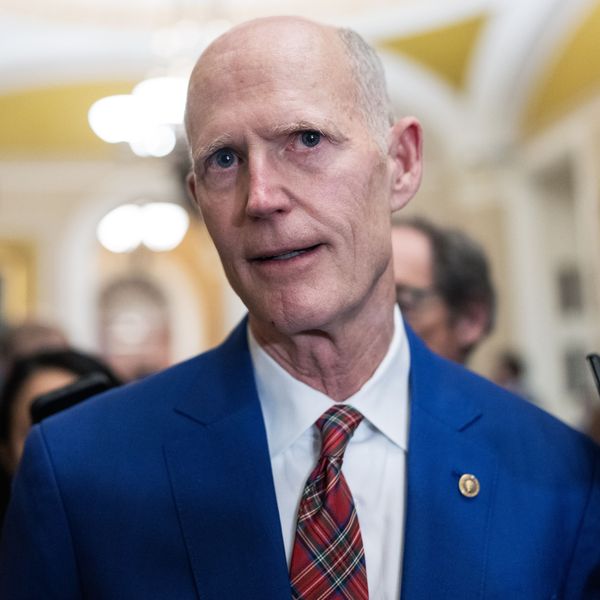The Ensign Healthcare Loophole
Taken at face value, Senator John Ensign's amendment which was
included in the final Senate healthcare bill sounds pretty decent: by
meeting "wellness" standards people can receive discounts on their
employer-based healthcare premiums. Stop smoking--pay less. Hit a
certain weight--pay less. Meet a cholesterol target--you get the idea.
Dems probably should have stopped and realized since the
amendment was offered by Ensign it probably wasn't motivated by
"wellness" at heart.
In fact, it allows premiums to be raised from current levels,
and then "discounts" would reduce the premiums to current rates. People
who don't meet the insurance companies' targets could pay up to 30
percent more for coverage, roughly $4000 based on the average cost of
family coverage. The amount could increase to 50 percent which is over
$6,600 for a family.
There is also the problem that this is biased against people
with a genetic predisposition to high blood sugar, hypertension, high
cholesterol, being overweight and a host of other often hereditary
conditions. It's also biased against a lower-income person working two
to three jobs to pay the bills, who has to stop and chow down some fast
food between jobs rather than get to the gym where he or she can't
afford a membership anyway. It's even biased against communities that
don't have grocery stores where they can find fresh fruits and
vegetables.
So what does this all mean? Remember a central promise of
healthcare reform--even the watered down version--how people with
preexisting conditions weren't supposed to be denied coverage or forced
to pay more for their insurance? That all sounded pretty good, right?
Well, guess again.
"Incentives quickly become penalties for those who cannot meet
the target," said Sue Nelson, vice president for federal advocacy at
the American Heart Association (AHA). The AHA has led a coalition
of more than 200 health and consumer organizations who oppose this
Senate provision, including the National Organization for Women,
American Cancer Society, the American Diabetes Association, and many
mental health groups. "A wellness program could consist solely of a
premium surcharge based on a blood cholesterol count over 200. [There]
are significant potential unintended consequences such as burdening
sicker employees and their families with significant increases in
healthcare costs thereby making coverage unaffordable for those who
need it the most."
Andrew Kurz, former chief financial officer of Wisconsin Blue
Cross-Blue Shield, probably knows as well as anyone what the loophole
means for Big Insurance.
" Wall Street demands focus on the bottom line, and insurers
comply," he said. "Insurers can spot profits miles away and this is a
loophole they will drive right through on Day One. As drafted, this
provision will not only harm millions of Americans who will be forced
to pay higher premiums. It will harm other efforts to bar insurance
companies from discriminating against customers."
Ultimately it's Democrats, not Senator Ensign, who bear the
responsibility for the inclusion of this insane provision. (And
apparently Chairman Max Baucus
spoke against this amendment in Committee before he voted for it in
"the spirit of bipartisanship"--thanks again, Max.) Now is the moment
to contact your legislators and tell them to rid the final healthcare bill of this gift to insurance--found in Section 2705 of the Senate bill.
An Urgent Message From Our Co-Founder
Dear Common Dreams reader, The U.S. is on a fast track to authoritarianism like nothing I've ever seen. Meanwhile, corporate news outlets are utterly capitulating to Trump, twisting their coverage to avoid drawing his ire while lining up to stuff cash in his pockets. That's why I believe that Common Dreams is doing the best and most consequential reporting that we've ever done. Our small but mighty team is a progressive reporting powerhouse, covering the news every day that the corporate media never will. Our mission has always been simple: To inform. To inspire. And to ignite change for the common good. Now here's the key piece that I want all our readers to understand: None of this would be possible without your financial support. That's not just some fundraising cliche. It's the absolute and literal truth. We don't accept corporate advertising and never will. We don't have a paywall because we don't think people should be blocked from critical news based on their ability to pay. Everything we do is funded by the donations of readers like you. Will you donate now to help power the nonprofit, independent reporting of Common Dreams? Thank you for being a vital member of our community. Together, we can keep independent journalism alive when it’s needed most. - Craig Brown, Co-founder |
Taken at face value, Senator John Ensign's amendment which was
included in the final Senate healthcare bill sounds pretty decent: by
meeting "wellness" standards people can receive discounts on their
employer-based healthcare premiums. Stop smoking--pay less. Hit a
certain weight--pay less. Meet a cholesterol target--you get the idea.
Dems probably should have stopped and realized since the
amendment was offered by Ensign it probably wasn't motivated by
"wellness" at heart.
In fact, it allows premiums to be raised from current levels,
and then "discounts" would reduce the premiums to current rates. People
who don't meet the insurance companies' targets could pay up to 30
percent more for coverage, roughly $4000 based on the average cost of
family coverage. The amount could increase to 50 percent which is over
$6,600 for a family.
There is also the problem that this is biased against people
with a genetic predisposition to high blood sugar, hypertension, high
cholesterol, being overweight and a host of other often hereditary
conditions. It's also biased against a lower-income person working two
to three jobs to pay the bills, who has to stop and chow down some fast
food between jobs rather than get to the gym where he or she can't
afford a membership anyway. It's even biased against communities that
don't have grocery stores where they can find fresh fruits and
vegetables.
So what does this all mean? Remember a central promise of
healthcare reform--even the watered down version--how people with
preexisting conditions weren't supposed to be denied coverage or forced
to pay more for their insurance? That all sounded pretty good, right?
Well, guess again.
"Incentives quickly become penalties for those who cannot meet
the target," said Sue Nelson, vice president for federal advocacy at
the American Heart Association (AHA). The AHA has led a coalition
of more than 200 health and consumer organizations who oppose this
Senate provision, including the National Organization for Women,
American Cancer Society, the American Diabetes Association, and many
mental health groups. "A wellness program could consist solely of a
premium surcharge based on a blood cholesterol count over 200. [There]
are significant potential unintended consequences such as burdening
sicker employees and their families with significant increases in
healthcare costs thereby making coverage unaffordable for those who
need it the most."
Andrew Kurz, former chief financial officer of Wisconsin Blue
Cross-Blue Shield, probably knows as well as anyone what the loophole
means for Big Insurance.
" Wall Street demands focus on the bottom line, and insurers
comply," he said. "Insurers can spot profits miles away and this is a
loophole they will drive right through on Day One. As drafted, this
provision will not only harm millions of Americans who will be forced
to pay higher premiums. It will harm other efforts to bar insurance
companies from discriminating against customers."
Ultimately it's Democrats, not Senator Ensign, who bear the
responsibility for the inclusion of this insane provision. (And
apparently Chairman Max Baucus
spoke against this amendment in Committee before he voted for it in
"the spirit of bipartisanship"--thanks again, Max.) Now is the moment
to contact your legislators and tell them to rid the final healthcare bill of this gift to insurance--found in Section 2705 of the Senate bill.
Taken at face value, Senator John Ensign's amendment which was
included in the final Senate healthcare bill sounds pretty decent: by
meeting "wellness" standards people can receive discounts on their
employer-based healthcare premiums. Stop smoking--pay less. Hit a
certain weight--pay less. Meet a cholesterol target--you get the idea.
Dems probably should have stopped and realized since the
amendment was offered by Ensign it probably wasn't motivated by
"wellness" at heart.
In fact, it allows premiums to be raised from current levels,
and then "discounts" would reduce the premiums to current rates. People
who don't meet the insurance companies' targets could pay up to 30
percent more for coverage, roughly $4000 based on the average cost of
family coverage. The amount could increase to 50 percent which is over
$6,600 for a family.
There is also the problem that this is biased against people
with a genetic predisposition to high blood sugar, hypertension, high
cholesterol, being overweight and a host of other often hereditary
conditions. It's also biased against a lower-income person working two
to three jobs to pay the bills, who has to stop and chow down some fast
food between jobs rather than get to the gym where he or she can't
afford a membership anyway. It's even biased against communities that
don't have grocery stores where they can find fresh fruits and
vegetables.
So what does this all mean? Remember a central promise of
healthcare reform--even the watered down version--how people with
preexisting conditions weren't supposed to be denied coverage or forced
to pay more for their insurance? That all sounded pretty good, right?
Well, guess again.
"Incentives quickly become penalties for those who cannot meet
the target," said Sue Nelson, vice president for federal advocacy at
the American Heart Association (AHA). The AHA has led a coalition
of more than 200 health and consumer organizations who oppose this
Senate provision, including the National Organization for Women,
American Cancer Society, the American Diabetes Association, and many
mental health groups. "A wellness program could consist solely of a
premium surcharge based on a blood cholesterol count over 200. [There]
are significant potential unintended consequences such as burdening
sicker employees and their families with significant increases in
healthcare costs thereby making coverage unaffordable for those who
need it the most."
Andrew Kurz, former chief financial officer of Wisconsin Blue
Cross-Blue Shield, probably knows as well as anyone what the loophole
means for Big Insurance.
" Wall Street demands focus on the bottom line, and insurers
comply," he said. "Insurers can spot profits miles away and this is a
loophole they will drive right through on Day One. As drafted, this
provision will not only harm millions of Americans who will be forced
to pay higher premiums. It will harm other efforts to bar insurance
companies from discriminating against customers."
Ultimately it's Democrats, not Senator Ensign, who bear the
responsibility for the inclusion of this insane provision. (And
apparently Chairman Max Baucus
spoke against this amendment in Committee before he voted for it in
"the spirit of bipartisanship"--thanks again, Max.) Now is the moment
to contact your legislators and tell them to rid the final healthcare bill of this gift to insurance--found in Section 2705 of the Senate bill.

